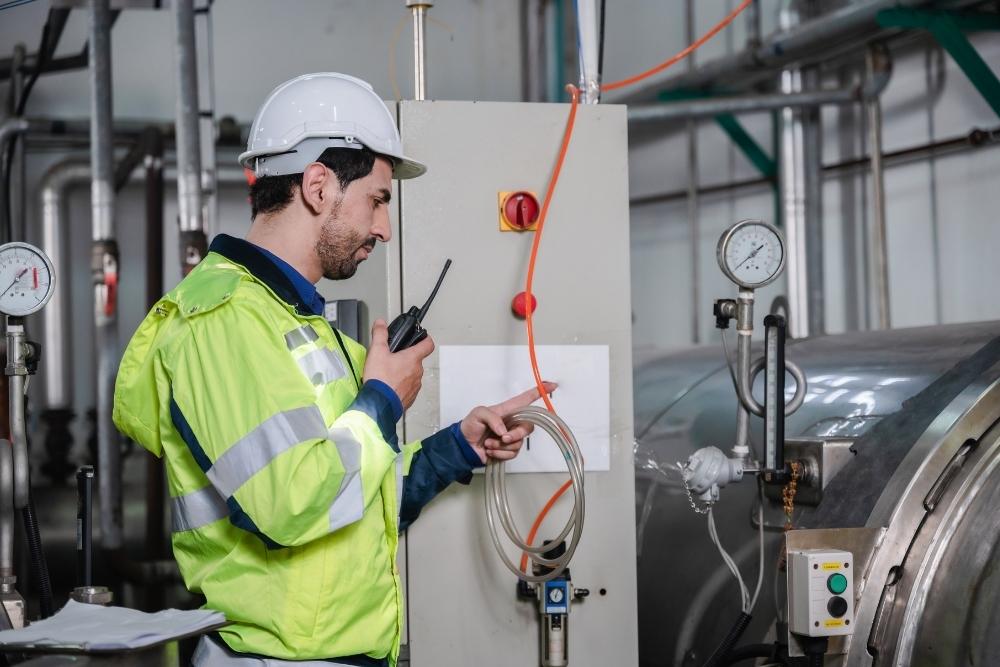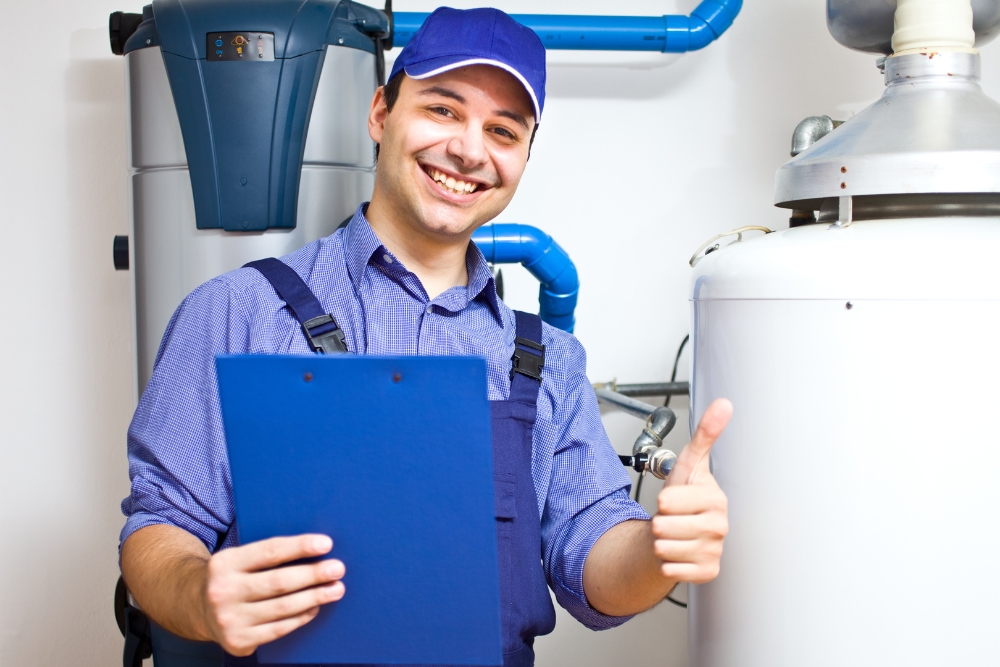Copping a cold splash when you’re chasing a toasty shower can be properly aggravating, hey? Trust our hot water heater services because we know the struggle and it’s a real dampener. Did you know that your household’s energy bill might cop almost 25% of its costs just from heating your bath water? Fair dinkum! So we’ve gone and done the hard yards to suss out top-notch answers for those all-too-common sparky troubles that throw a spanner in the works of water heaters.
Our guide’s chock-a-block with easy-to-follow advice is meant to sort out the mystery behind your hot water hiccups, giving you the tools for some cracking good DIY fixes. Ready to get into it and turn things up a notch?
Key Takeaways
- Common electrical issues with water heaters include not having enough hot water, no hot water at all, slow recovery times for heating the water, relief valves releasing water unexpectedly, leakage from the unit and safety switches or breakers tripping.
- To troubleshoot electric water heater problems yourself, check thermostat settings and power supply issues like tripped breakers or blown fuses first. If these aren’t to blame, it could be a faulty heating element or sediment buildup in the tank that requires professional attention.
- Electric and gas hot water systems have differences such as energy sources and installation processes but also share similarities like needing a tank for storage, thermostats for temperature control, pressure relief valves for safety and insulation to maintain heat.
- For persistent problems like fluctuating temperatures or leaks around your heater – or if you’re unsure about DIY fixes – don’t wing it; reach out to a licensed plumber or electrician who’s schmick on fixing these kinds of snags.
- Regular annual maintenance by professionals can keep your system humming along without a hitch and help you dodge future run-ins with cold showers and steep repair bills.
Hot Water Heater Services
When it comes to hot water heater services, it’s important to understand the differences between electric and gas water heaters, as well as the similarities between the two systems. Whether you have an electric or gas water heater, knowing how they work will help in identifying and addressing common electrical issues.

Differences between electric and gas water heaters
When choosing a hot water system, it’s crucial to know the differences between electric and gas water heaters. Each has unique features and benefits. Here’s a quick comparison in table format to help you understand at a glance:
Differences Between Electric and Gas Water Heaters
| Feature | Electric Water Heater | Gas Water Heater |
|---|---|---|
| Energy Source | Electricity | Natural Gas or LPG |
| Cost of Operation | Typically higher due to the cost of electricity | Generally lower as gas is often cheaper than electricity |
| Installation | Usually easier and less expensive, as no venting is required | More complex due to the need for venting exhaust gases |
| Energy Efficiency | Good, but can vary depending on the model | Very good, particularly with newer condensing models |
| Recovery Rate | Slower, takes more time to reheat water | Faster, can heat a larger amount of water more quickly |
| Environmental Impact | Higher carbon footprint if the electricity is not from renewable sources | Lower carbon footprint when using natural gas, but still emits greenhouse gases |
| Space Requirements | Less space needed, no need for a gas line or flue | May need more space for safe operation and venting |
We’ve laid out these key differences clearly because we understand the importance of making an informed decision. Your choice will depend on your energy preferences, budget, and home setup. Moving on, let’s dive into the common electrical issues you might encounter with your hot water heater services.
Similarities between gas and electric water heating systems
Gas and electric water heating systems share several similarities in functionality. Both types of heaters have a tank that stores and heats the water. They both have a thermostat to control the temperature of the water stored in the tank, ensuring it is at the desired level for use.
Additionally, both gas and electric water heaters have a pressure relief valve to prevent excess pressure build-up within the tank.
Another similarity between gas and electric water heating systems is their usage of insulation to maintain the heat inside the tank, ultimately conserving energy by reducing heat loss.

Common Electrical Issues in Hot Water Heater Services
If you find yourself running out of hot water more often than not, or worse yet, if there’s no hot water at all, it may be time to have your electric hot water heater checked for electrical issues.
Slow hot water heater recovery, relief valve sporadically releasing water, and leaks are some other common problems that may indicate an electrical fault in your hot water system.
Not enough hot water
If you’re experiencing not enough hot water from your electric system, it could be due to a faulty heating element or thermostat. These issues can prevent the water from reaching the desired temperature, resulting in an inadequate hot water supply.
A professional plumber or electrician can diagnose and replace the faulty components to restore your water heater’s functionality.
Inadequate hot water may also stem from sediment buildup in the tank affecting its performance. Flushing the tank might help alleviate this issue and improve your hot water supply.
No hot water
If you’re experiencing no hot water, check the thermostat settings on your electric hot water heater. Adjust the temperature setting and wait for an hour to see if the issue resolves. If not, inspect the heating element for any signs of damage or wear.
It may need replacement by a qualified plumber or electrician who specialises in hot water system repairs.
In addition, check the power supply to your electric water heater. Ensure that it is receiving electricity by checking the circuit breaker or fuse box for tripped breakers or blown fuses.
Slow hot water recovery
If your hot water heater is taking longer than usual to recover and produce hot water, it could be due to several electrical issues. A common cause of slow hot water recovery is a faulty heating element in an electric water heater.
When the heating element fails, it can significantly impede the system’s ability to heat water efficiently. Additionally, sediment buildup in the tank can also contribute to slow hot water recovery by insulating the heating elements and preventing them from effectively warming the water.
To address these issues, it’s essential to have a professional plumber or electrician inspect and potentially replace any malfunctioning components and flush out accumulated sediment for optimal performance.
Moreover, inadequate thermostat settings or a malfunctioning thermostat can lead to sluggish hot water recovery times in an electric hot water system. Irregular temperature regulation can hinder the proper function of the heating elements, resulting in prolonged wait times for sufficient warm water supply.
Relief valve sporadically releasing water
If your relief valve sporadically releases water, it could be a sign of excessive pressure or high temperature inside the hot water heater. To address this issue, turn off the power and cold-water supply to the unit.
Then, open a hot water tap to release some pressure from the tank before testing the temperature and pressure relief valve for any potential faults. If you notice continuous leakage after taking these steps, it is best to call a professional plumber or electrician immediately to avoid any potential hazards.
Regular maintenance of your hot water system can help prevent issues with relief valves releasing water sporadically due to overpressure or high temperatures inside the unit. Make sure to schedule routine checks by qualified professionals as part of your water heater maintenance plan.
Water heater leaking
If your hot water heater is leaking, it’s crucial to address the issue promptly. Leaking can be caused by a variety of issues such as a faulty temperature and pressure relief valve, corrosion in the tank, or loose connections.
Ignoring a leaking water heater can lead to significant damage and potential safety hazards. Make sure to turn off the power supply and shut off the water source immediately while waiting for professional assistance.
Additionally, if you notice pooling water around your water heater, do not ignore it. Contact a qualified plumber or electrician experienced in hot water system repairs to diagnose and fix the leak before it causes further damage.
Safety switch/breaker tripping
If your hot water heater is causing the safety switch or breaker to trip frequently, it could indicate an electrical problem that needs immediate attention. Ignoring this issue can lead to potential safety hazards and further damage to the hot water system.
The tripping of the safety switch or breaker may be caused by a faulty heating element, excessive sediment buildup in the tank, a short circuit, or a wiring problem. It’s crucial to have a qualified plumber or electrician inspect and diagnose the issue to prevent any risk of electric shock or fire hazard.
Regular maintenance and timely repairs are essential for ensuring the safe and efficient operation of your electric hot water system. Addressing safety switch/breaker tripping issues promptly will not only protect your home from electrical damage but also help you avoid unexpected disruptions in the hot water supply.
When to Call a Plumber or Electrician for Hot Water Heater Issues
If your hot water heater is experiencing any of the following issues, it’s time to call a professional for help:
- Persistent lack of hot water or fluctuating temperature
- No hot water at all, despite troubleshooting attempts
- Prolonged wait for hot water recovery after heavy usage
- The relief valve releases water sporadically, indicating potential pressure problems
- Noticeable leakage around the water heater
- Frequent tripping of the safety switch or breaker
Get to Know More about Common Electrical Issues
In conclusion, it’s important to address common electrical issues in hot water heater services promptly. Addressing these problems early can prevent bigger, more costly repairs down the line.
Regular maintenance and timely intervention from a qualified professional play a crucial role in ensuring that your electric hot water heater operates smoothly and efficiently for years to come.
If you notice any of these common electrical issues with your hot water heater, don’t hesitate to seek the expertise of a certified plumber or electrician.






